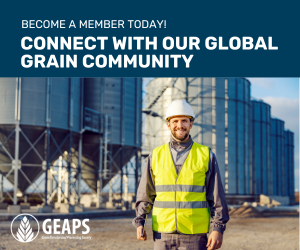GEAPS/Grain Journal Announce Monthly Webinars for 2019
GEAPS/Grain Journal Announce Monthly Webinars for 2019
The Grain Elevator and Processing Society (GEAPS) and Grain Journal magazine have teamed up to offer a free series of webinars from June through November. All of these sessions review and recap popular education sessions from GEAPS Exchange 2019. Learn more about webinars on GEAPS’ website.
Utilizing Laser Scanning with your Next Facility Project
Tuesday, June 25, 10 a.m.
Ross McEllhiney, Louis Dreyfus Company
Improve designs and installation accuracy during your next facility project by using 3-D laser scanning and equipment modeling. 3-D laser cloud points eliminate the need for as-built drawings and greatly improve design accuracy. Proper use of scans can reduce engineering and construction costs. 3-D modeling, laser scanning, drones and modern modeling software have created complete virtual reality versions of our facilities and design accuracies of plus or minus one half inch across an entire facility. You will gain a better understanding of these new approaches and technology.
Importance of Risk Management to Grain Elevators and Their Customers
Thursday, July 11, 10:00 a.m.
Rich Jelinek and Jake Moline, INTL FC Stone
Every grain elevator should be fully informed about price risk management. This concept impacts both your bottom line and that of your customers. This webinar will present the highlight markets that are available to elevators and some common applications to protect your bottom line and enhance your grain origination.
Rail Design: On Track Insights for Your Site
Wednesday, Aug. 21, 10 a.m.
Quin Vincent, VAA
Rail design influences facility and process operations, ranging from on-site truck flow to personnel safety and overall site layout. Creating a strategy for rail components during the early phases of a project allows the design to work to the best advantage of facility owners and managers. This presentation covers a range of rail-related design details and things to avoid. Learn about the benefit of coordinating all receiving/loadout options, advice for meeting stringent railroad requirements and the process of incorporating rail on existing sites.
Understanding and Managing Generations
Wednesday, Sept. 18, 2 p.m.
Carlie Crouch, Perdue Learning University
Their reputations precede them. Millennials are entitled and lazy, Gen X can’t get along, and Baby Boomers are just out of touch. It’s time to stop listening to these negative stereotypes and let this session set the record straight! Learn about the strengths and challenges associated with each generation so that you can better manage coworkers and understand your family.
How Tired is Too Tired? How Fatigue is Impacting Your Business
Tuesday, Oct. 15, 2 p.m.
Emily Whitcomb, National Safety Council
Fatigue is a factor in workplace productivity and increases the risk of employee incidents and injuries. One study found that 13 percent of workplace injuries were attributed to employees with sleep problems. Nearly every American worker reports at least one risk factor for fatigue, and almost half admit to being sleep deprived. Sleep deficiency and disorders cost a typical medium-sized employer $1 million a year in lost productivity, missed work days and health care costs. Identify causes of workplace fatigue, and implement best practices to reduce risk and decrease the financial burden of sleep-deprived employees.
Facility Design: Maximizing Efficiency and Throughput
Wednesday, Nov. 13, 2 p.m.
Dr. Kurt Rosentrater, Iowa State University
Grain elevator facilities have grown and evolved from simple storage sites to large, high throughput and highly automated processing plants. This trend is driven by the consolidation of country elevators due in part to local economic conditions and changing railroad regulations. Increased demand for grain storage space, especially as yearly harvests increase, is another reason for this growth. This session focuses on facility design as it relates to overall efficiency and throughput. Learn how to design and prioritize short and long-term plans for grain facilities to
meet ever-changing industry demands.
GEAPS Professional Development Programs
GEAPS is committed to providing numerous educational opportunities to teach current and future generations of grain handling and processing professionals the latest trends and best practices. GEAPS offers training material in a variety of formats, including in-person courses and facility tours, interactive hands-on training and online offerings.
Programs include:


